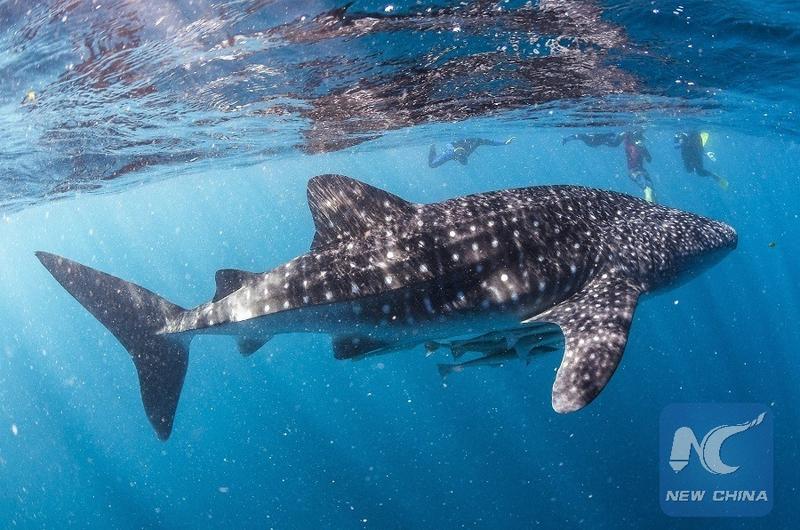 This photo taken on July 11, 2016 shows divers watching a whale shark near Ningaroo Reef in Western Australia. (NATHAN LIN / XINHUA)
This photo taken on July 11, 2016 shows divers watching a whale shark near Ningaroo Reef in Western Australia. (NATHAN LIN / XINHUA)
COLOMBO - The largest fish species in the world in the Indian Ocean are getting injured by ships and boats, speeding the extinction of them, marine experts have warned.
According to a recent Press Trust of India report on Tuesday, marine experts have raised alarm that lately a large number of whale sharks, often spotted along the coasts of Indian Ocean littoral countries, are being found with injury marks caused due to ships and boats sailing in the Indian Ocean.
The Indian Ocean is home to 75 percent of the population of whale sharks, a slow-moving, filter-feeding carpet shark and the largest fish species on the Earth.
The whale shark feeds on the surface of the ocean... so for nearly 80 percent of time they are on the surface of the water and that is the reason they get injured by sea traffic.
Rima Jabado, Vice-chairman of Indian Ocean region, International Union for Conservation of Nature Shark Specialist Group
The "gentle giants" of the sea are often spotted off the Gujarat coast and other coastal states of India.
Recently, most of the whale sharks in the Indian Ocean region were found with injury marks on their bodies by divers and all those who observed them closely, Vice-Chairman of Indian Ocean region of IUCN Shark Specialist Group Rima Jabado told PTI on Thursday.
The International Union for Conservation of Nature (IUCN) consists of both government and civil society organizations.
"The injuries are caused due to heavy traffic of ships and boats passing from the migration route of the whale shark in the Indian Ocean region," she said.
ALSO READ: Cracking the mysteries of the elusive, majestic whale shark
Jabado was recently in Gujarat to participate in the Conference of Parties on Conservation of Migratory Species (CMSCOP 13).
"Still, we require to study and pinpoint which are the exact spots from where the whale shark is getting injured while they are migrating", she said.
Only after conducting such a study experts could suggest measures to prevent injuries to them, Jabado said.
"The whale shark feeds on the surface of the ocean... so for nearly 80 percent of time they are on the surface of the water and that is the reason they get injured by sea traffic", she explained.
Jabado, who is based in Dubai, said whale sharks are on the endangered species list of CMS (Convention on Migratory Species).
The Indian Ocean is home to 75 percent of the population of whale sharks
Over the past 75 years, the population of whale sharks in the world has gone down by 50 percent, she said.
Though India has done well to halt the capture of whale sharks by giving financial incentives to fishermen, poaching continues on the coast of many other countries, she said.
John K Carlson, a fish biologist associated with the National Oceanic and Fisheries Administration of the US Department of Commerce, said at the CMSCOP 13 they had asked member parties to do more for conservation of whale sharks.
ALSO READ: The real 'Jaws': Great white shark's genetic secrets revealed
India has persuaded fishermen to release as many as 781 whale sharks caught in their nets along the Gujarat coast since 2004, after an awareness campaign was launched to save the species.
During the period, the Gujarat forest department paid Rs 91.20 lakh as compensation to fishermen who released whale sharks by cutting nets in which they were entangled, principal chief conservator of forest Dinesh K Sharma said.
"We have managed to save 781 whale sharks after the state government, with the help of religious leader Morari Bapu, launched a campaign called whalli whale (dear whale) against the capture of whale sharks", he said.
Earlier, whale sharks were captured in large numbers by fishermen off the Gujarat coast for their meat and oil.
 Underwater diving enthusiasts play with a whale shark as tourists watch, at Chimelong Ocean Kingdom in Zhuhai, south China's Guangdong province, Sept 12, 2017. (LIU DAWEI / XINHUA)
Underwater diving enthusiasts play with a whale shark as tourists watch, at Chimelong Ocean Kingdom in Zhuhai, south China's Guangdong province, Sept 12, 2017. (LIU DAWEI / XINHUA)
The whale shark is the largest fish in the world. The average size of an adult whale shark is estimated at 9.8 meters. However, whale sharks as large as 18 meters have also been found.
A whale shark weighs an average of 9 tonnes. They feed mostly on plankton and small fishes, and pose no threat to humans, which is the reason they are called ‘gentle giants.
Coasts along Malvan in Maharashtra, Netrani Island in Karnataka, Lakshwadeep Islands, and Krishna and Kakinada in Andhra Pradesh are places where whale sharks are found along the Indian coast.
Internationally, they are found along coasts of many countries in the Indian Ocean region, Qatar being one of the hotspots.
According to the Fisheries Fact Sheet issued by the Government of Australia, whale sharks (Rhincodon typus) are found throughout the world’s tropical and warm, temperate seas. They are known to inhabit both deep and shallow coastal waters and the lagoons of coral islets and reefs, and prefer surface seawater temperatures of 21 – 25 degrees Celsius.
Whale sharks occur throughout the Indian Ocean and have also been reported near the Maldives, Seychelles and Comoros Islands, and along the coastlines of Madagascar, Mozambique, Kenya, Pakistan, South Africa, Sri Lanka, India, Thailand, Indonesia and Malaysia.
Despite their size, whale sharks do not pose significant danger to humans. They are gentle, docile creatures that are at times playful and curious. Snorkellers swim with these giant fish without real risk, apart from the chance of an unintentional blow from the shark’s large tail fin.


